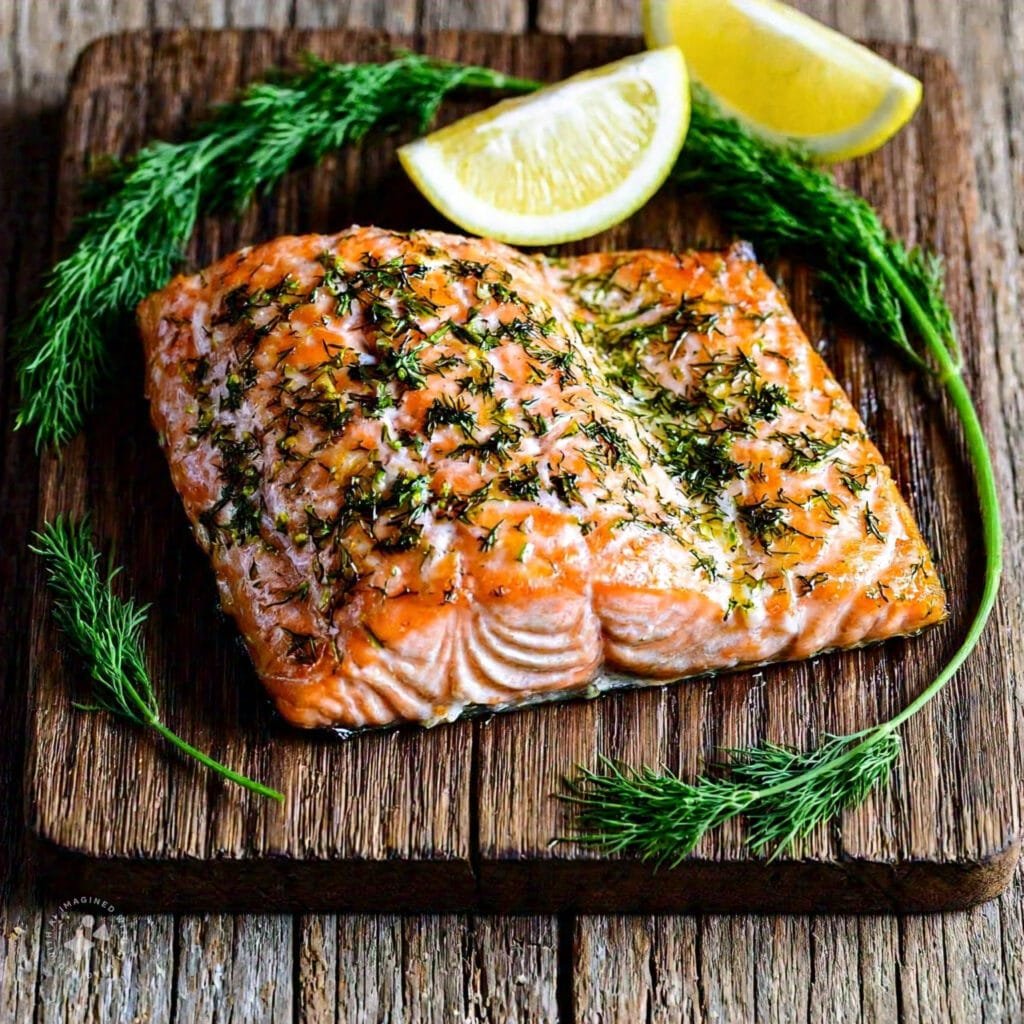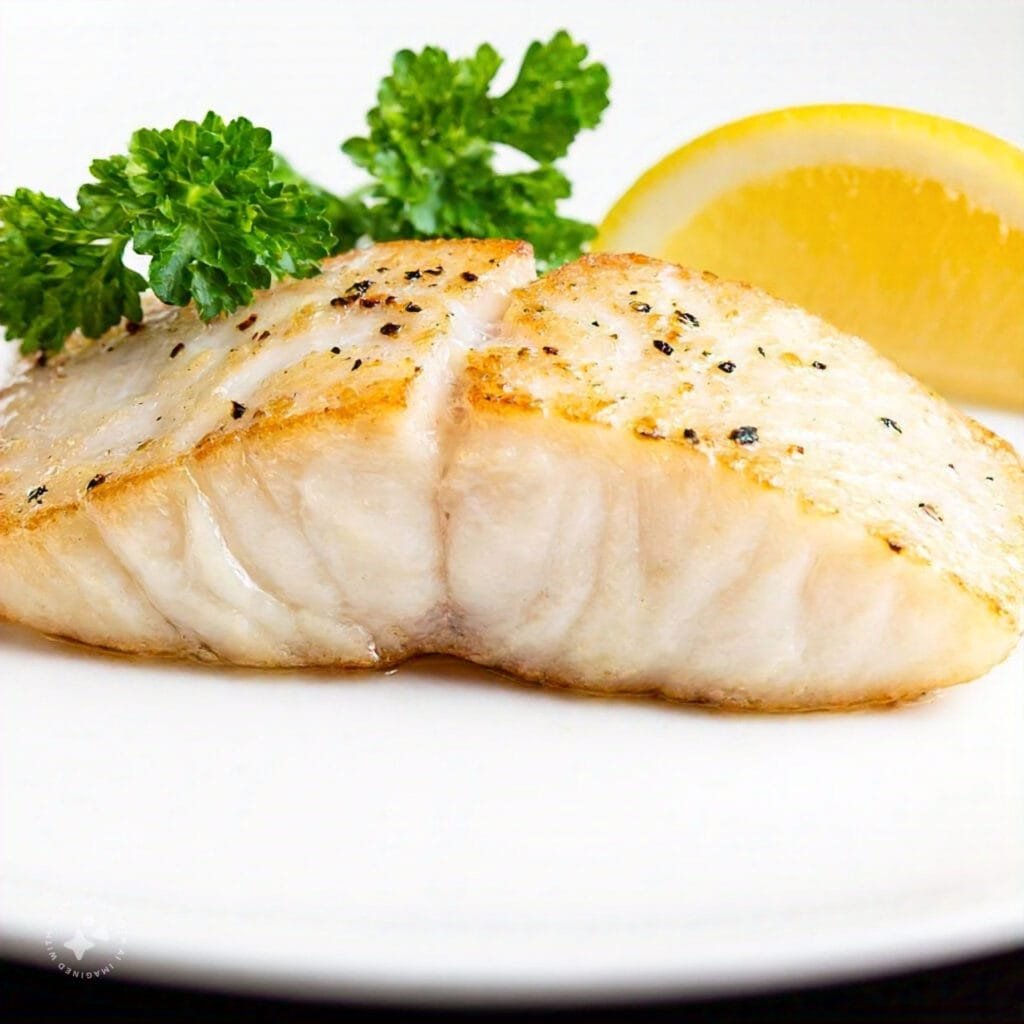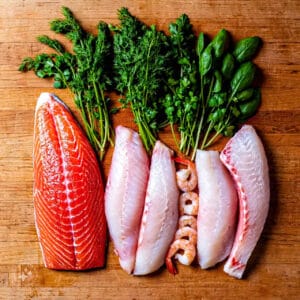Table of Contents
Introduction to Pairing Herbs With Fish
When it comes to seafood, a common question is, what herbs go with fish? The right herbs can elevate even the simplest fish dishes, turning them into mouthwatering masterpieces. Whether you’re preparing salmon, tilapia, or shrimp, herbs like dill, parsley, and thyme are the secret to adding depth, freshness, and irresistible aroma to your cooking. So, let’s dive in and discover how to perfectly pair fish with herbs that bring out the best in every bite.
Think about herbs as the “secret sauce” that enhances not just the flavor but also the aroma of your fish dishes. If you’ve ever felt unsure about which herbs to use, you’re not alone. The good news? There’s a perfect herb (or a mix) for every type of fish. Whether it’s the buttery richness of salmon, the light flakiness of cod, or the briny taste of shrimp, there’s always a herb that fits.
“Cooking fish without herbs is like painting a canvas with just one color—you need the herbs to bring the masterpiece to life!”
In this article, we’ll explore the best herbs to pair with fish, break down specific pairings by fish type, and share tips on how to use herbs effectively in your cooking. Trust me, by the end, you’ll feel like a seafood chef extraordinaire!
Why Herbs Are Essential for Enhancing Fish Dishes
Let’s face it—fish can sometimes taste a little bland on its own. That’s where herbs swoop in to save the day! Herbs don’t just add flavor; they also balance out the natural taste of fish. For example, if you’re cooking oily fish like salmon or mackerel, herbs with bright or citrusy notes help cut through the richness. On the other hand, milder white fish pairs well with subtle, fresh herbs like parsley or dill.
Here’s why herbs are a game-changer for fish recipes:
- They Add Layers of Flavor: Herbs infuse complexity into your dishes without overpowering the fish’s natural flavor.
- They Enhance Aromas: Fresh herbs can make your entire kitchen smell like a five-star restaurant. (Who doesn’t love that?)
- They Elevate Presentation: Let’s be honest—a sprinkle of fresh green herbs makes your fish look Instagram-worthy.
- They Bring Health Benefits: Many herbs like basil, parsley, and thyme are packed with antioxidants, vitamins, and nutrients.
So, next time you cook fish, don’t leave the herbs out. Think of them as the perfect co-star that steals the show!
The Best Herbs That Pair Well With Fish
Now comes the fun part—let’s talk herbs! Here’s a deep dive into the best herbs you can use to elevate your fish dishes. Whether you want something earthy, citrusy, or aromatic, there’s an herb for every taste preference.

Dill: A Perfect Match for Seafood
When it comes to herbs and fish, dill is like peanut butter and jelly—it’s just meant to be! Dill’s light, feathery leaves and mild anise-like flavor complement fish beautifully, especially salmon, trout, and white fish.
- Why It Works: Dill has a refreshing flavor that pairs perfectly with delicate fish.
- How to Use It: Sprinkle fresh dill over baked or grilled fish. Mix it into a creamy sauce or marinade.
- Best Fish Pairings: Salmon, trout, cod, and halibut.
Try a simple dill sauce: Mix yogurt, lemon juice, chopped dill, and garlic for a zesty topping.
“Dill and fish are like soulmates—simple yet unforgettable together!”
Parsley: Versatile and Fresh Flavor
Parsley is one of the most versatile herbs for cooking. It’s fresh, mild, and slightly peppery—perfect for enhancing the natural taste of fish without overwhelming it.
- Why It Works: Parsley adds a clean, bright flavor. It’s great for cutting through richness.
- How to Use It: Sprinkle chopped parsley over grilled fish or mix it into a garlic butter sauce.
- Best Fish Pairings: White fish, tilapia, and sole.
Pro tip: Combine parsley with lemon zest for a simple yet impactful garnish.
Basil: Sweet and Aromatic Addition
If you love Italian flavors, basil is your best friend. This sweet, aromatic herb pairs beautifully with Mediterranean-style fish recipes. Basil works wonders with tomato-based sauces and citrus flavors.
- Why It Works: Basil’s bright and slightly sweet notes add a refreshing contrast to fish.
- How to Use It: Make a basil pesto to drizzle over grilled fish, or add fresh basil leaves to fish stews.
- Best Fish Pairings: Tuna, sea bass, and mahi-mahi.
Basil pesto: Blend fresh basil, garlic, pine nuts, parmesan, and olive oil—simple and delicious!
Thyme: Earthy and Subtle for Fish Recipes
Thyme is a fantastic herb for fish dishes that require a more savory, earthy touch. It’s subtle but adds depth to baked or grilled fish. Bonus: it works great in marinades.
- Why It Works: Thyme’s earthy flavor pairs well with both mild and bold fish.
- How to Use It: Sprinkle fresh thyme on fish before baking, or mix it into a lemon-thyme marinade.
- Best Fish Pairings: Halibut, cod, and salmon.
Cooking tip: Thyme holds up well to heat, making it perfect for roasted fish dishes.
Cilantro: Adding a Bold, Citrusy Kick
Cilantro, also known as coriander leaves, is bold, citrusy, and slightly tangy. It’s a fantastic herb for fish tacos, grilled fish, and Asian-inspired recipes.
- Why It Works: Cilantro’s bright flavor enhances fish with a bold, refreshing twist.
- How to Use It: Sprinkle chopped cilantro on fish tacos or add it to a lime-based marinade.
- Best Fish Pairings: Tilapia, shrimp, and sea bass.
Pair cilantro with lime and garlic for a fresh, zesty combo that’ll wake up your taste buds! 🌿
Tarragon: A Licorice-Like Flavor for Fish
Tarragon is an underappreciated herb that deserves a spotlight. Its slight licorice flavor works particularly well with delicate fish dishes, especially those with creamy sauces.
- Why It Works: Tarragon’s unique, sweet flavor elevates mild fish without overpowering it.
- How to Use It: Add fresh tarragon to fish in creamy sauces, or mix it into herb butter.
- Best Fish Pairings: Salmon, sole, and haddock.
Tarragon tip: Add it sparingly—it’s bold, so a little goes a long way!
Fresh Herbs vs. Dried Herbs for Fish
Here’s the million-dollar question: should you use fresh or dried herbs with fish? Both have their place in the kitchen, but it depends on the dish you’re cooking.
- Fresh Herbs: Fresh herbs are vibrant, aromatic, and perfect for garnishing or adding at the end of cooking. They’re best for delicate dishes like poached or grilled fish.
- Dried Herbs: Dried herbs have a more concentrated flavor and work well in marinades, rubs, and hearty fish recipes. Use them early in cooking to let the flavors infuse.
Quick Tip: If a recipe calls for fresh herbs but you only have dried, use 1/3 of the amount since dried herbs are more potent.
The Role of Regional Cuisine in Herb Selection
Herbs and fish pairings often vary depending on regional cuisines, influenced by geography, traditions, and locally available ingredients. If you’re someone who loves experimenting in the kitchen, diving into regional herb and fish combinations will take your seafood game to the next level. Let’s explore how different regions approach fish and herbs.
Mediterranean Flavors: Fresh and Zesty
In Mediterranean cuisine, simplicity and freshness are key. The herbs used here enhance the fish without overshadowing its natural flavors.
- Herbs Commonly Used: Basil, oregano, parsley, and thyme.
- Fish Often Featured: Sea bass, mackerel, sardines, and bream.
- Classic Pairing: A baked sea bass topped with a mix of parsley, lemon zest, garlic, and olive oil.
Mediterranean dishes often rely on fresh herbs, vibrant citrus flavors, and high-quality olive oil. It’s no wonder the region’s seafood is considered some of the best in the world!
Asian Cuisine: Bold and Citrusy
Asian cuisine uses herbs to create bold, aromatic, and often citrusy dishes. Here, herbs don’t just act as a garnish; they’re integral to the dish.
- Herbs Commonly Used: Cilantro, Thai basil, lemongrass, and mint.
- Fish Often Featured: Tilapia, snapper, shrimp, and catfish.
- Classic Pairing: A steamed snapper with cilantro, ginger, and soy sauce for a fragrant and savory dish.
Herbs like cilantro and lemongrass add a fresh, zesty kick to fish. Combine them with lime juice, garlic, and chili for a burst of flavor that screams “authentic Asian cuisine!”
Scandinavian Cuisine: Subtle and Earthy
In Scandinavian cooking, herbs are used more subtly to enhance the clean, fresh taste of fish. The focus is often on preserving the natural flavors.
- Herbs Commonly Used: Dill, chives, and tarragon.
- Fish Often Featured: Salmon, herring, and cod.
- Classic Pairing: Grilled salmon topped with a creamy dill sauce or pickled herring garnished with chives.
Dill is undoubtedly the king of Scandinavian seafood dishes. It’s used in everything from marinades to sauces, adding a refreshing, earthy note.
Caribbean Cuisine: Fresh and Spicy
Caribbean cooking is all about bold, vibrant flavors with a hint of spice. Fresh herbs play a crucial role in marinades, rubs, and salsas.
- Herbs Commonly Used: Cilantro, thyme, and mint.
- Fish Often Featured: Snapper, mahi-mahi, and grouper.
- Classic Pairing: Grilled mahi-mahi marinated in thyme, garlic, and lime juice, topped with a mango-cilantro salsa.
Caribbean dishes often combine fresh herbs with tropical fruits like mango or pineapple for a sweet and savory balance. It’s like a vacation on a plate! 🏝️
Most Common Fish and Herb Pairings
Not all herbs work with every type of fish. Some fish are rich and oily, while others are light and mild. The trick is finding herbs that complement the specific qualities of the fish. Let’s break this down into categories for easy reference.
Herbs for White Fish (Cod, Tilapia, Haddock)
White fish is mild, flaky, and delicate. It pairs well with fresh, light herbs that enhance rather than overpower its subtle flavor.

- Best Herbs: Parsley, dill, thyme, basil, and chives.
- How to Use Them:
- Sprinkle parsley and lemon zest over baked cod.
- Add dill to a creamy sauce for poached tilapia.
- Use thyme in a garlic butter marinade for haddock.
White fish acts like a blank canvas, allowing fresh herbs to shine and bring out its best qualities.
Herbs for Oily Fish (Salmon, Mackerel, Tuna)
Oily fish are rich, flavorful, and packed with omega-3s. These fish need herbs that can balance out their bold taste.
- Best Herbs: Dill, basil, cilantro, tarragon, and mint.
- How to Use Them:
- Top grilled salmon with fresh dill and lemon.
- Add cilantro to a lime and garlic marinade for mackerel.
- Use tarragon in a creamy sauce for seared tuna.
Oily fish are already bold, so pairing them with bright, zesty herbs helps cut through the richness.
Herbs for Shellfish and Seafood (Shrimp, Lobster, Mussels)
Shellfish and seafood have a sweet, briny taste that works wonderfully with citrusy and aromatic herbs.
- Best Herbs: Cilantro, basil, parsley, thyme, and chervil.
- How to Use Them:
- Toss shrimp with cilantro and lime juice for a vibrant dish.
- Add parsley and thyme to a garlic butter sauce for lobster.
- Steam mussels with white wine, garlic, and fresh parsley.
Shellfish benefit from herbs that amplify their natural sweetness and add a touch of brightness.
How to Use Herbs Effectively in Fish Recipes
Using herbs the right way can make all the difference. Here are some practical tips to ensure you get the most out of your herbs when cooking fish.
- Add Fresh Herbs at the End: Fresh herbs lose their flavor when cooked for too long. Add them just before serving for maximum impact.
- Use Dried Herbs in Marinades and Rubs: Dried herbs work well when mixed with oil, garlic, or lemon juice to create flavor-packed marinades or rubs.
- Infuse Herbs into Sauces: Simmer herbs like thyme or tarragon in creamy sauces to infuse flavor without overpowering the dish.
- Try Herb Crusts: Combine breadcrumbs, herbs, and a little olive oil to create a crispy herb crust for baked fish.
- Experiment with Herb Combinations: Don’t be afraid to mix and match herbs like dill, parsley, and chives to create unique flavor profiles.
“A sprinkle of fresh herbs at the end is like putting the cherry on top of a masterpiece—it takes the dish from good to great!”
Common Problems When Cooking Fish With Herbs and Solutions
Cooking fish with herbs may seem straightforward, but there are a few pitfalls that can throw your dish off balance. Don’t worry—I’ve got your back! Here are the most common problems home cooks face and practical solutions to fix them.
Overpowering Flavors: How to Balance Herbs
One of the biggest mistakes when cooking fish with herbs is overloading the dish. Remember, fish is delicate, and too many strong herbs can mask its natural flavor.
Problem: You’ve added too much tarragon, basil, or cilantro, making the fish taste “herby” instead of balanced.
Solution:
- Use strong-flavored herbs like tarragon or basil sparingly. A little goes a long way.
- Balance bold herbs with lighter ones. For example, pair tarragon with parsley for a milder finish.
- Add acidity like lemon juice or vinegar to tone down overpowering flavors.
If you find your dish is too herby, don’t panic. Fresh citrus juice or even a dollop of yogurt can help mellow out the excess flavors.
Fresh Herbs Burning: Preventing Cooking Mistakes
Have you ever sprinkled fresh herbs on fish before grilling or baking, only to find them burnt and bitter? It happens to the best of us!
Problem: Fresh herbs like parsley or dill burn under high heat, leaving a charred, unpleasant flavor.
Solution:
- Add fresh herbs at the end of cooking. For grilled or roasted fish, sprinkle them on after the fish comes off the heat.
- Use dried herbs for high-heat cooking instead. They hold up better and won’t burn.
- Infuse fresh herbs into butter, oil, or sauces instead of applying them directly to the fish.
A simple trick: If you’re baking fish, mix herbs with olive oil and brush it on lightly. This protects the herbs and infuses flavor without burning.
Choosing the Right Herbs for Specific Fish Types
Sometimes, the problem isn’t with the cooking method but with pairing the wrong herb with the wrong fish. Not all herbs work with every type of seafood.
Problem: You’ve used a bold herb like rosemary on a delicate white fish, and the flavor feels mismatched.
Solution:
- Stick to lighter herbs like dill, parsley, and chives for mild white fish.
- Pair bold herbs like basil, thyme, or tarragon with richer, oilier fish like salmon or tuna.
- Experiment with citrusy herbs like cilantro for seafood and shellfish.
The general rule of thumb? The bolder the fish, the bolder the herbs. Balance is everything!
Tips for Growing Your Own Fresh Herbs for Fish Dishes
There’s something incredibly rewarding about using fresh herbs straight from your garden. Not only do they taste better, but growing your own herbs also saves money and ensures you always have fresh, vibrant greens at your fingertips. Here’s how you can start your own herb garden to elevate your fish dishes.
Choosing the Right Herbs to Grow
Start small by growing the herbs you use most often with fish. Here’s a quick list of easy-to-grow herbs:
- Dill: Grows quickly and thrives in cool weather. Perfect for salmon and white fish.
- Parsley: Low-maintenance and grows well in pots or gardens. Ideal for garnishing fish.
- Cilantro: Thrives in warm weather and adds a citrusy kick to seafood dishes.
- Basil: Loves sunlight and pairs well with Mediterranean-style fish recipes.
- Thyme: A hardy herb that’s perfect for roasted or grilled fish.
Tips for Growing Herbs Indoors
If you don’t have outdoor space, you can still grow herbs indoors! Here’s how:
- Use small pots with drainage holes to avoid root rot.
- Place herbs on a sunny windowsill where they’ll get at least 6 hours of sunlight daily.
- Water sparingly. Most herbs prefer slightly dry soil.
- Harvest herbs regularly by snipping leaves to encourage new growth.
A simple kitchen herb garden can be a game-changer. Fresh herbs within arm’s reach? Yes, please!
Preserving Your Fresh Herbs
Sometimes you grow more herbs than you can use—lucky you! Here’s how to keep them fresh:
- Freeze: Chop herbs and mix them with olive oil, then freeze in ice cube trays. These make great herb-infused cooking starters.
- Dry: Tie herbs like thyme or rosemary into bundles and hang them upside down in a dry, dark place.
- Refrigerate: Wrap herbs in a damp paper towel and store them in an airtight bag to keep them fresh for up to a week.
Preserving herbs ensures you can enjoy their flavor all year long, even when they’re not in season.
Frequently Asked Questions
What is the best herb for salmon?
Dill is the go-to herb for salmon. It’s light, refreshing, and perfectly complements the rich, buttery texture of salmon. Basil, tarragon, and parsley also work well.
Can I use dried herbs instead of fresh ones for fish?
Yes, you can! Use dried herbs in marinades or rubs, but reduce the quantity since dried herbs are more potent. Always add fresh herbs at the end of cooking for a burst of flavor.
What herbs go best with shrimp?
Cilantro, parsley, and basil are excellent choices for shrimp. Pair them with citrus juice and garlic for a fresh, zesty dish.
How do I prevent fresh herbs from burning when grilling fish?
Add fresh herbs like dill or parsley after grilling. For infused flavors, mix fresh herbs with oil and brush it onto the fish before grilling.
What’s a simple herb sauce for fish?
Try a quick herb sauce: Combine fresh dill, parsley, lemon juice, garlic, and yogurt for a creamy, tangy topping.
What herbs pair well with white fish?
Parsley, dill, chives, and thyme are perfect for mild white fish like cod, tilapia, and haddock.
Conclusion: Enhance Your Fish Dishes With the Perfect Herbs
Cooking fish can feel intimidating, but once you’ve mastered the art of pairing herbs, it’s truly a joy. Whether you’re using fresh dill to elevate baked salmon, cilantro for zesty shrimp, or thyme for roasted white fish, herbs are the unsung heroes that transform seafood dishes.
Herbs add more than just flavor—they bring freshness, balance, and vibrancy to your meals. By understanding which herbs complement different types of fish and learning how to use them effectively, you’ll never serve a boring fish dish again.
So, the next time you’re standing in the kitchen, remember: Herbs are your best friend when it comes to cooking fish. Don’t be afraid to experiment, mix herbs, and let your creativity shine. After all, the best dishes come from a little love, a sprinkle of herbs, and a dash of confidence. Happy cooking! 🌿🐟
“Herbs don’t just season the fish; they bring it to life!”
You might also like:





